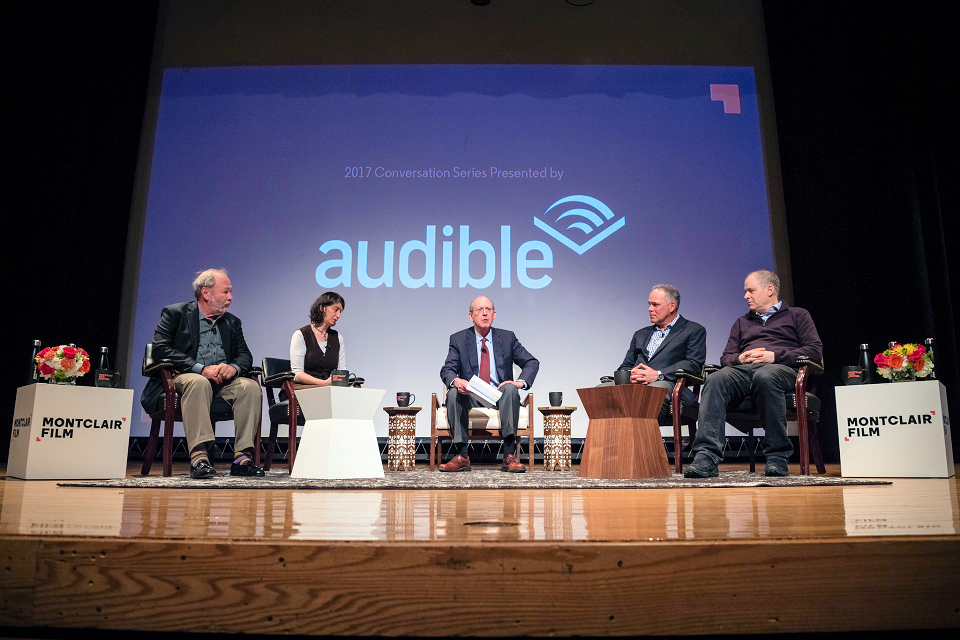News
Enlightening Conversation About Journalism in “Fake News” Era

Montclair Film Festival was proud to host a distinguished panel of journalists and authors Sunday afternoon for one of our signature events, the In Conversation Series, co-presented by Audible. Sunday’s panel, held in partnership with Retro Report, addressed the extremely timely issue of accuracy and fairness in news reporting–aptly named IN CONVERSATION: TRUE OR FALSE? REPORTING IN THE “FAKE NEWS” ERA.

Photo by Neil Grabowsky / Montclair Film
After joking that his fellow panelists were all “enemies of the American people,” Clyde Haberman, moderator and contributing journalist at The New York Times and RetroReport asked the first question: “Why are journalists in our line of work so distrusted?”
He sat in the center of the Montclair Kimberley Academy stage with a distinguished and experienced panel of news professionals and authors: Jonathan Alter, NBC News contributor and author of three books on U.S. presidents; Jim Alexrod, CBS News correspondent; Sarah Blustain, investigative reporter with The Investigative Fund; and Joe Klein, Time columnist.
Although all four panelists had different responses, the large audience heard reflections on the importance of good journalism and the American people’s changing tastes in news consumption.
“The media lost the trust of the American people,” said Jonathan Alter, “when the label changed to media from press.” He explained that when the best newspapers of the country such as The New York Times dominated as “the press,” Americans had a trust in the “power of the press.” But now large media conglomerates dominate the 24/7 news cycle, and he stated that Americans had developed a distrust for “the media power” of such large businesses.

Photo by Neil Grabowsky / Montclair Film
“I’ve been working in this profession for 48 years,” said Joe Klein. “We’re in the golden age of marketing now.” He explained that marketing the differences of the media options has become a media message. He continued that many journalists who previously held the mindset of healthy skepticism had now slid into cynicism.
“If we do not have shared facts,” asked Haberman, “is there a threat to our democracy?” The panelists began to discuss the impact of the Trump election.

Photo by Neil Grabowsky / Montclair Film
Sarah Blustain responded, “We’ve had huge changes in civic engagement since the election,” suggesting that protests and activism were signs of hope.

Photo by Neil Grabowsky / Montclair Film
On the other hand, Klein suggested, “There’s a problem in the larger society… we’ve lost the values of citizenship.”
Jim Axelrod shared the perspective of Pennsylvania miners he had recently interviewed for a CBS story. They overwhelmingly voted for Trump. They told Axelrod that their mining grandfathers would be rolling over in their graves since they no longer supported the Democrats. Axelrod stated that miners told him that they can’t trust the media when more than 80% of journalists supported Hillary Clinton.
Alter admitted that too many journalists may have become “disconnected from the man/woman on the streets.” Yet Alter offered a criticism of how the media covered the presidential election: “The media gave Trump way too much coverage.”
Blustain, currently working for non-profit news organizations, commented on how shifts in advertising trends have definitely influenced changes in the world of journalism. “We’re in a very transitional time,” she said.
All the panelists nevertheless agreed that journalists still strive to get at “the truth.” Axelrod noted that fact-checking stories has always been and still is critical at CBS News. Because a single tweet can raise questions about any news story, he explained that the professionals he works with remain committed to accurate reporting.
“The arc of journalism bends toward truth,” said Alter, emphasizing that the First Amendment will protect the importance of truth.
After the panel discussion, the audience had the chance to ask questions of their own. “Is the type of credibility that someone like Tim Russert had even possible today?” asked one audience member. “Why is news coverage on networks such as CNN and MSNBC so repetitive?” asked another.
The panel ultimately defended the integrity of many professional journalists in an era of change and fragmentation.
View more pics from this event!
Written by MFF Blogger Nancy VanArsdale
-
Genre